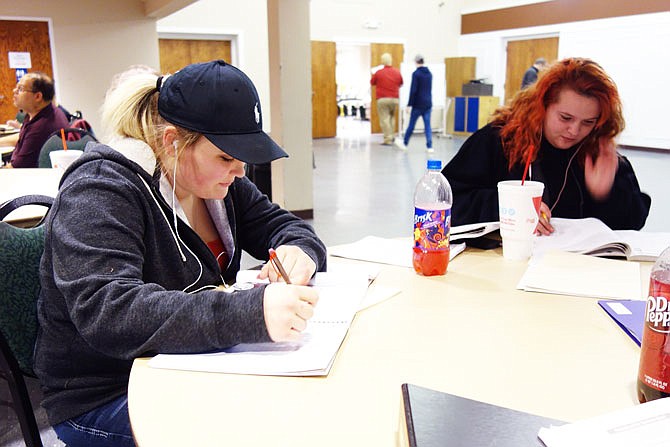He spent six years in a classroom where he couldn't hear a single word.
That's how determined Tim Schultz is to complete the High School Equivalency Test (formerly GED).
"I've been working on it for a while now," Schultz said Tuesday through an American Sign Language interpreter.
Until five months ago, Schultz had no access to an interpreter, which made following classes difficult. With the help of an interpreter and the Adult Education and Literacy Program's classes at John C. Harris Community Center, he is making progress toward his goal of a better job.
"I would just like to go work at a hospital, and whatever they let the deaf do, I'll do," he said.
Schultz didn't earn a diploma because he spent his teenage years working for a higher cause.
"I'm a Jehovah's Witness," he explained. "I was spreading the word to other deaf (people)."
Now, he's among the 15 people enrolled in the evening HiSET class at the community center. On Tuesday, the students - who appear to range from teens to middle-aged - settled down with textbooks and worksheets while enticing smells wafted in from the soup kitchen next door.
Cliff Atterberry, the evening class's teacher, hustled around assuring that everyone had the right books.
"This is my first time teaching adults," he said. "I've realized that I need to freshen up on my own stuff. Remember that question you'd ask in school, 'Are we ever going to use this in real life?' The answer is apparently yes, as a HiSET teacher."
Atterberry followed the quip with a laugh. He spent six years teaching at Head Start, Fulton Public Schools' preschool. Recently, he's worked as the youth career manager at Fulton's Missouri Job Center. He plans on bringing some of the lessons he teaches at Job Center, like resume-building and interview skills, to the HiSET classes.
"In fact, a majority of the people in here also qualify for my youth program," he added.
Atterberry pointed out the learners are all at different levels in different subjects, which can make classes a bit of a juggling act. However, most of the students are focused on the ultimate goal: passing the HiSET. A high school diploma or an equivalent is a prerequisite at most jobs, certification programs and higher learning institutes, he said.
"I want to be able to start a career," Rachel Waltrip said.
She dropped out of high school partway through her senior year in 2014.
"It was either be homeless and go to school, or get a job and have a home," she said.
Now that her situation is more stable, Waltrip wants to pass the HiSET. But she doesn't plan to stop there; her ultimate goal, she said, is to be a registered nurse.
"It's a lot more hard work, but I like the challenge," she said of the class. "If you're motivated and work hard, you can do it."
Justin Atterberry, who currently works as a dietary aid, is also hoping the HiSET will provide a path to a better career. He, too, dropped out of school.
"I want to do something better with my life," he said.
Ambitions for a better job or continuing education are big motivators for young class-takers, according to the program's director. Stephanie Schler formerly directed a similar program in Columbia before joining the Fulton one in August, she said.
In her experience, students have many reasons for taking the class. Middle-aged students have often hit a ceiling in their careers and want better opportunities. For some older students, it's a bucket-list item.
Schler added she doesn't yet have data about how many class-takers go on to pass the HiSET, because Adult Education and Literacy Program only took over the classes in 2016. The program is funded through a grant from the Missouri Department of Elementary and Secondary Education and is partnered with the Jefferson City school district.
Those who pass the class even get to take part in a graduation ceremony.
"I love helping the students get little successes, and helping them realize they can really do it," Schler said. "So many of them think they just can't do it. The little successes eventually add up to that big success."
She thinks that some people who might benefit from the class are held back because they're embarrassed they don't have a diploma. That shouldn't be a barrier, Schler said.
"The great thing about coming here is that everyone's in the same boat," she said.

